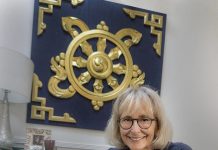By Bradley Zint, Special to the Independent
More than 40 people tuned into a virtual discussion sponsored by the Susi Q Senior Center on Tuesday that explored racism and policing in America.
Moderated by Laguna Beach resident Al Gumb as an installment of the TED Talks Club, the wide-ranging, two-hour live Zoom meeting featured guest speakers giving different perspectives. Viewers were invited to ask questions.
The meeting was not recorded for repeat viewing.
Although most of the discussion did not pertain specifically to Laguna Beach or its police, panelist and educator Rebecca Washington-Lindsey, shared an experience that she said demonstrated how racism remains “alive and well” in Laguna.
Washington-Lindsey, who is Black and has a Ph.D. in intercultural and interracial communications, said she was racially profiled while walking in Laguna Beach. Someone called the police on her. An officer responded, but upon seeing Washington-Lindsey, he recognized her from a prior conservation the two had.
Nothing happened, she added. But had the officer not remembered her, something far worse or invasive could have, she said.
“That’s systemic racism,” Washington-Lindsey said, “and it happens all the time.”
She said people of color “want to be treated fairly … we just want equal treatment. I want to know I’m just like everybody else.”
Matthew Ross, an assistant professor at Claremont Graduate University who studies police labor economics, provided several insights about racial disparities in policing.
He suggested that data shows ethnic minorities, compared to white people, are more likely to be searched by police and less likely to get a break from receiving a ticket. He also noted that Black drivers are actually less likely to be caught with contraband than white drivers.
Armando Yearwood, a Marine Corps veteran and former Long Beach police officer, said there remains a “major disconnect” between many police departments and the communities they serve.
“We have to get a bridge to cross over so that both sides understand each other better,” he said.
He noted that police training standards vary across states, but that California has a strict process that includes a one-year probationary status where officers are constantly evaluated and have to account for all their on-duty activities.
“There are a lot of parameters these officers have to live within,” Yearwood said.
David Lloyd, an attorney, commented that police have internalized the many racial orientation biases that have been present in the U.S. for hundreds of years. He also said that tracking police-involved shootings is difficult because data regarding it is not routinely compiled or made available.
The panelists also provided input on the slogan “defund the police” that has been a rallying cry in this year’s protest movements.
Ross said the slogan had a horrible name, but was really more about adding money for social services. He added that police officers should be paid more for the work they do, not less, and that top pay will attract top talent.
Yearwood called defunding police “a scary thought.”
“How do we train officers if they need re-training?” he said. “Instead of defunding, we need to pour money into places smartly.”




